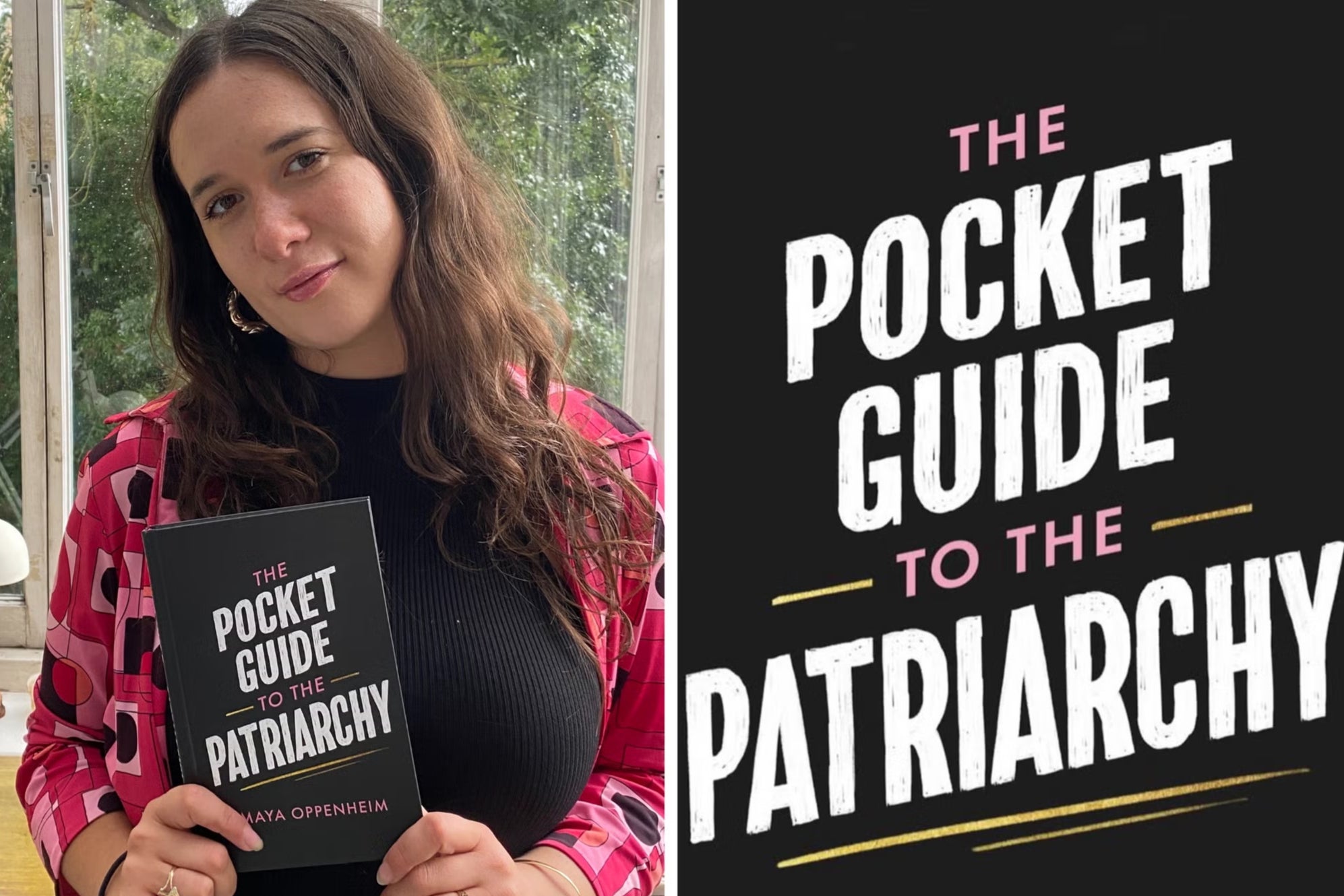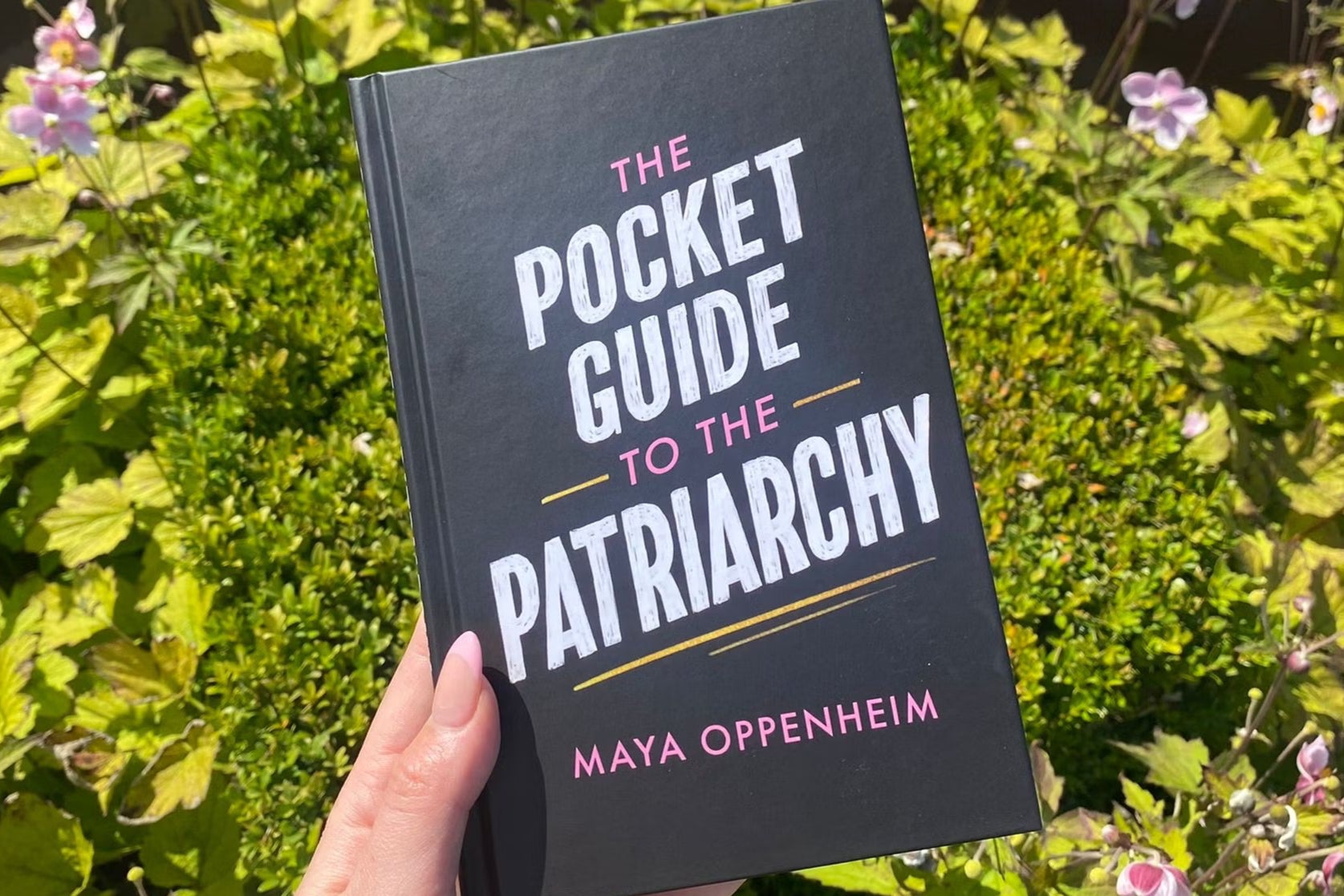The Independent's journalism is supported by our readers. When you purchase through links on our site, we may earn commission.
The Pocket Guide to the Patriarchy: A book to educate yourself and your misogynistic uncle
In her first book, Maya Oppenheim explores scandalous statistics and distressing anecdotes to educate and embolden readers to challenge injustice


Your support helps us to tell the story
From reproductive rights to climate change to Big Tech, The Independent is on the ground when the story is developing. Whether it's investigating the financials of Elon Musk's pro-Trump PAC or producing our latest documentary, 'The A Word', which shines a light on the American women fighting for reproductive rights, we know how important it is to parse out the facts from the messaging.
At such a critical moment in US history, we need reporters on the ground. Your donation allows us to keep sending journalists to speak to both sides of the story.
The Independent is trusted by Americans across the entire political spectrum. And unlike many other quality news outlets, we choose not to lock Americans out of our reporting and analysis with paywalls. We believe quality journalism should be available to everyone, paid for by those who can afford it.
Your support makes all the difference.When an ex told me things are far harder for men than women in the world, I reeled off a litany of facts and figures that proved that this was wrong. I was used to comments such as these. This was not a man with one solitary chip on his shoulder, but a whole overflowing bag of them. I love chips, but not his metaphorical and therefore embittered and perennially victimised kind.
This notion that things are much harder for men is not a unique or isolated perspective. There is a growing army of men who are threatened by gender equality and want us to renege and backtrack on hard-won progress. However, it is neither constructive nor helpful to get caught up in debates centred around whether men or women have it worse. For me, a desire to engage in such discussions indicates a dogmatic, reductive, black-and-white worldview that lacks nuance. Given we live in a cruelly unequal world where the poorest 50 per cent of the population own only two per cent of the total net wealth, it is clear many people are suffering.
But as The Independent’s women’s correspondent, I am well acquainted with the plethora of ways women experience misogyny, oppression and injustice around the world. This is not just from the work I do but also from my own day-to-day life. Whether I’m on a dating app or at a party, or having an impromptu chat with a stranger on a train, everywhere I go I encounter fans of the misogynistic influencer Andrew Tate. Perhaps this is unsurprising, though, when you consider a recent poll revealed around a quarter of young men in the UK aged between 18 and 29 agree with Tate’s views on how women should be treated. YouGov data, shared exclusively with me, also found 28 per cent of men between 30 and 39 who had heard of Tate back his outlook on women.
How do we counteract and challenge such virulent and widespread misogyny? Educating yourself is never a bad place to start. For those wanting to learn more about the devastating repercussions of gender inequality and misogyny around the world, I present you with The Pocket Guide to the Patriarchy – my 22-chapter book being published by Hatchette this coming Thursday. Packed with stats and real-world examples which will make you do a double take, this is a book to educate yourself and others. The book has chapters on everything from sexual violence to policing, women’s health, the criminal justice system, sex work, feminist trailblazers, the far right, transphobia, abortion rights and much more, but here is an extract from the introduction to give you a taster.
***
There is no shortage of grim stats that elucidate the bleak repercussions of misogyny and gender inequality. As the only women’s correspondent at a UK news outlet, I am all too familiar with these facts and figures. Take the statistic that between two and three women are killed by a current male partner or ex-partner every single week in England and Wales, or that a woman is killed by a current or ex-partner with a gun every 16 hours in America. Or that less than 20 per cent of landholders in the world are women. Or that 80 per cent of those displaced by climate change are estimated to be women.
Or that in some countries around the world, the legal restrictions on abortions are so stark that women risk long prison sentences – even women who become pregnant after being raped or if her pregnancy has a fatal foetal anomaly or if her health conditions mean she could die from carrying to term or giving birth. Or the fact that roughly 40 per cent of women who are of reproductive age are living somewhere in the world where pregnancy terminations are either illegal or restricted.

Meanwhile, unsafe, backstreet, clandestine abortions are a leading cause of maternal deaths around the world. This is bound to increase substantially in the US, given that the Supreme Court overhauled Roe v Wade – the landmark decision that legalised abortion nationwide in 1973 – in June 2022, with millions of women losing their legal right to have a pregnancy terminated. What’s more, let’s not forget that around 140 million women are effectively ‘missing’ around the world due to families choosing to have an abortion as they would prefer to have a son, or not properly caring for a newborn girl.
On top of all this, women are statistically more likely than men to work in low-paid, insecure, precarious forms of employment with zero-hours contracts. They are also far more likely to suffer domestic abuse or sexual violence. The World Health Organisation states that one in three women across the world will be forced to endure physical or sexual violence at some point in their lives and it will most likely be perpetrated by a partner. This is unsurprising when 38 per cent of all murders of women around the world are carried out by partners.
Despite the grisly statistics, there is still a shocking number of men, and some women, too, who will tell you sexism and misogyny no longer exist, and that things are now equal for men and women
In the UK, it is critical to remember just how recently some of the rights women take for granted were introduced. Just a few decades ago, women were in many ways de facto children and second-class citizens in the eyes of the law. Before 1975, women in the UK were barred from opening a bank account in their own name. Moreover, single women were not allowed to submit an application for a loan or a credit card in their own name without getting a signature from their father until the mid-1970s. In the same decade, women were regularly denied mortgages, or were only permitted them if they got a male guarantor to provide a signature. On top of this, women could legally be denied a drink in British pubs until as recently as 1982.
To this very day, women still face a litany of deeply ingrained inequalities in the UK and around the world. Studies have found it is often women who eat “last and least” in nations wrestling with war or hunger. While in Afghanistan, the Taliban has fiercely escalated restrictions on women’s day-to-day freedoms and rights since seizing power of the Afghan capital, Kabul, in mid-August 2021. The group, which previously ruled the country, has blocked women from the workplace, education and public spaces, as well as barring them from taking part in all sports and relinquishing the right to travel alone. But, of course, it is not just women around the world suffering; in a bitterly unequal world where the poorest 50 per cent of the world’s population own a meagre two per cent of the total net wealth, there are many losers.
Despite the aforementioned grisly statistics, there is still a shocking number of men, and some women, too, who will tell you sexism and misogyny no longer exist, and that things are now equal for men and women. Whether it is the performative woke bloke who suddenly reveals himself to be a rampant misogynist or the well-meaning but know-it-all uncle who keeps saying things that make your skin crawl, so many of us have experienced those frustrating moments when your experience is denied and you can’t find the words to challenge it. So how do you stand up to those folks who are in denial that misogyny exists? Well, this book – which is replete with clear data, digestible bite-sized gems, campaigning resources and thought-provoking quotes – is a good place to start.
The Pocket Guide to the Patriarchy will show you, and help you show others, how different elements of the patriarchy are connected, and what we can – and must – do to tackle this.

In this book, I will shine a glaring, unflinching hydroponic light on the injustice suffered by so many women and people of marginalised genders. And in the same way that hydroponic lights help plants to grow, I hope this guide will help you expand your own understanding, and in doing so help others grow some requisite knowledge, so the seeds are planted for a better future. In each chapter, I share important statistics and, in some, I share wins and developments that have been made. Not every chapter has wins listed because in certain areas I felt there was a dearth of significant and enduring breakthroughs.
On a separate note, it is worth bearing in mind the issues explored in this book impact the lives of women, trans, nonbinary and gender diverse individuals. Women are not the only individuals who menstruate, give birth, have abortions or experience harassment, violence or economic insecurity and the topic matters we will go on to explore have crippling repercussions on gender diverse individuals too. While gender diverse people are not always explicitly mentioned throughout the book, their experiences must not be discounted or overlooked. What’s more, it must also be remembered the patriarchy does not serve all men equally and its structures inflict harm on them too.
Knowledge is important, as it is so often the people who have done the least homework who shout the most aggressively that gender inequality is all but a myth. This suspicious, incredulous view of gender inequality is rife in far-right circles. So as the far right grows – restyling and sugar-coating itself but retaining and even bolstering its destructive fascist ideals – the more people inside and outside the movement seem to adopt this perspective.

It is no secret that the fight for women’s rights, trans rights and gender equality has become a key casualty in the repugnant ramping-up of the so-called “culture wars”. But what exactly are the ”culture wars”? At first glance, the phrase, which routinely pops up in headlines, might sound like a synonym for Mariah Carey versus Mozart, or Tolstoy versus 10 Things I Hate About You, but “culture wars” are not a reference to purported “low” versus “high” culture. On the contrary, the Cambridge Dictionary defines culture wars as “disagreements about cultural and social beliefs between groups, especially between people with more conservative opinions and people with more progressive opinions”.
In some ways the culture wars are caricatures of a certain set of values, as well as a modern manifestation of the historic division between right- and left-wing politics. Those on the conservative side of the culture wars often promote traditional notions of the family, take an essentialist, biologically deterministic view of gender and resist notions of structural racism, as well as taking a traditionalist and perhaps nationalist approach to society, which glorifies the past and dismisses emotional sensitivity from so-called “snowflakes”. Those on the progressive side, meanwhile, may be more cosmopolitan, metropolitan, permissive, tolerant, emotionally open, and have a critical understanding of race and a non-essentialist view of gender, which champions the rights of different gender identities. However, there are of course nuances, grey areas and exceptions to these broad-stroke examples of the dividing lines.
The explosion of the culture wars, no doubt fuelled by provocative, opportunistic, divisive politicians, is part and parcel of a growing backlash against feminism, with the grim term “feminazis” slung around men’s rights circles online more and more, and the realities of women’s experience minimised and weaponised against us.
With all that in mind, this is a book to arm you with the facts and real-world stories to tell your friends and foes why we have much further to go to extricate and liberate women from inequality and injustice.
‘The Pocket Guide to the Patriarchy’ is released 31 August, and is available for pre-order here.





Join our commenting forum
Join thought-provoking conversations, follow other Independent readers and see their replies
Comments